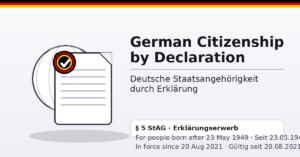Administrative Court Würzburg, 04.02.2020, Case No.: W 10 K 18.31208
Anyone who receives a rejection notice can generally file a lawsuit against it. Various claims can be made: the granting of a specific request, the modification of the decision, or the declaration of the unlawfulness of the decision. For the latter, however, a specific requirement must be met: the plaintiff must have a legitimate interest in having the administrative act declared unlawful.
In this case, the plaintiff was denied permission to engage in employment, which led him to file a lawsuit seeking the declaration of the unlawfulness of the denial. The Administrative Court of Würzburg, however, dismissed the lawsuit as inadmissible, as no special interest in the declaration was apparent.
1. Facts and Background
The plaintiff, a Nigerian national, applied for asylum in Germany. During the ongoing asylum process, he applied for permission to work as a warehouse and production assistant. The Federal Office for Migration and Refugees (BAMF) rejected the asylum application in May 2017, along with a deportation order to Nigeria. A legal entry and residence ban for 30 months was also imposed. Despite the negative decision, the plaintiff acknowledged paternity for an unborn German child in July 2017. In January 2018, he applied again for a work permit, which was denied. The plaintiff then filed a lawsuit against this denial at the Bavarian Administrative Court Würzburg.
2. Denial of Asylum Application and Consequences
In May 2017, the plaintiff’s asylum application was rejected. This decision was based on the low recognition rate for Nigerian asylum seekers and the negative assessment of the plaintiff’s individual asylum case. The Central Foreigners Authority (ZAB) then decided to deny the plaintiff permission to work. Key reasons for this were the lack of a clear prospect of staying, the plaintiff’s unclear identity, and considerations of migration policy.
3. Paternity Acknowledgment and Application for Employment
In July 2017, the plaintiff acknowledged paternity of a child who would obtain German citizenship. In January 2018, he reapplied for a work permit, this time as a warehouse and production assistant at the company O. He argued that employment would allow him to spend more time with his child and fulfill his support obligations. However, the ZAB denied this application, citing the plaintiff’s poor prospects of staying in Germany due to the negative asylum decision and his unclear identity. The fact that the plaintiff was the father of a German child did not change the negative decision.
4. Rejection by the Central Foreigners Authority
The ZAB rejected the application for a work permit because, after the rejection of his asylum application, the plaintiff had no good prospect of staying in Germany. Additionally, his identity was not sufficiently clarified, as he did not present a valid passport or other documents that clearly confirmed his identity. The authority also argued that even though the plaintiff had acknowledged paternity for a German child, he could not receive a residence permit during the ongoing asylum process. The denial of the work permit was also based on migration policy considerations to avoid creating false incentives.
5. Plaintiff’s Argument and Authority’s Response
The plaintiff argued that the ZAB’s decision was flawed, as his prospects of staying were improved by his paternity of a German child. He pointed out that § 10 Abs. 3 Sentence 3 AufenthG lifts the prohibition on issuing a residence permit when a legal entitlement under § 28 Abs. 1 Sentence 3 AufenthG exists. Furthermore, he argued that the public security interests cited by the authority were not comprehensible. The ZAB, however, maintained its decision, clarifying that the plaintiff did not meet the requirements for a residence permit under § 28 AufenthG because his identity was unclear and he did not sufficiently provide care for his child.
6. Judgment and Reasoning of the Administrative Court
The Administrative Court of Würzburg dismissed the plaintiff’s lawsuit. The court found that the plaintiff, after the final rejection of his asylum application, had no entitlement to a work permit. There was no continuing interest in a declaratory judgment under § 113 Abs. 1 Sentence 4 VwGO, as there was no sufficient risk of repetition. Additionally, the court did not see any violation of the plaintiff’s fundamental rights, as neither Art. 12 Abs. 1 GG (freedom of occupation) nor Art. 6 GG (protection of marriage and family) were affected. The judgment emphasized that the plaintiff had no legal entitlement to the requested permit based on current law, and the ZAB’s decision was lawful.
Source: Administrative Court of WürzburgSource: Administrative Court Würzburg
Important Note: The content of this article has been prepared to the best of our knowledge and belief. However, due to the complexity and constant evolution of the subject matter, we must exclude liability and warranty. Important Notice: The content of this article has been created to the best of our knowledge and understanding. However, due to the complexity and constant changes in the subject matter, we must exclude any liability and warranty.
If you need legal advice, please feel free to call us at 0221 - 80187670 or send us an email at or send an email to info@mth-partner.de info@mth-partner.de
Lawyers in Cologne advise and represent clients nationwide in immigration law.




